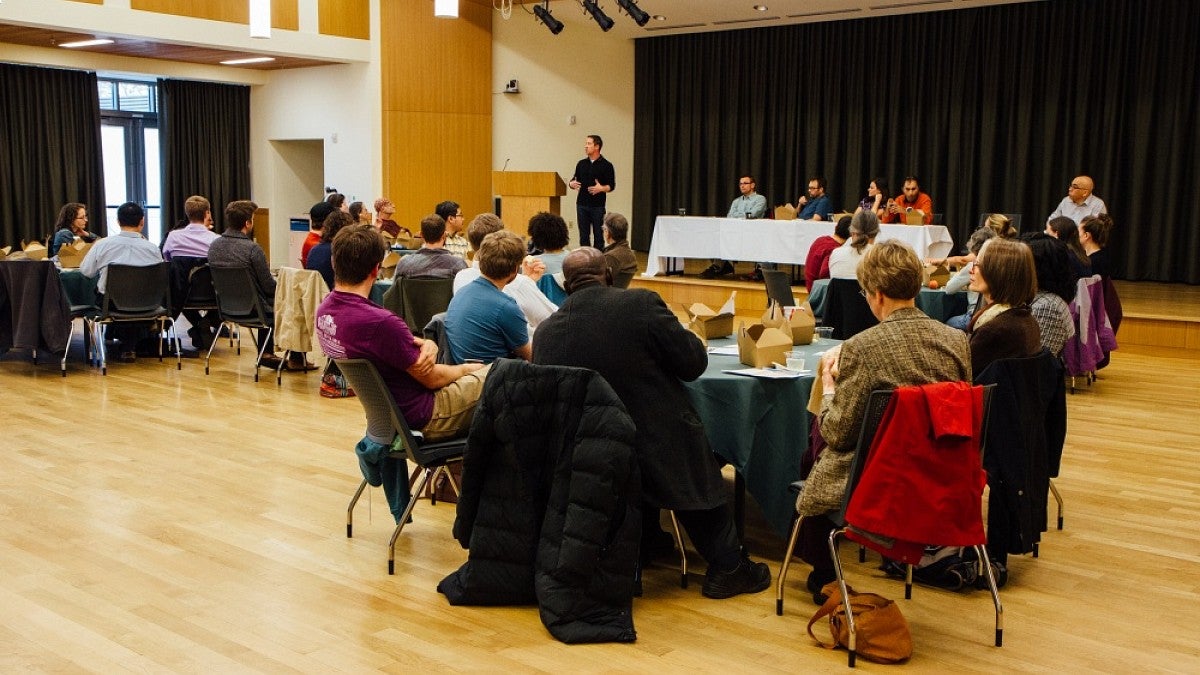Equity and inclusion is as important in the natural sciences as any other part of the university or society, and the UO College of Arts and Sciences is taking steps to cement that understanding.
At a recent workshop for faculty in the natural sciences, psychology professor Gordon Nagayama Hall, interim director of the Center on Diversity and Community, teamed up with ethnic studies and political science associate professor Daniel HoSang to highlight the contributions UO faculty and staff are making to equity and inclusion, while emphasizing the importance of these principles to the UO’s mission.
“Equity and inclusion is part of our work in the natural sciences — it is not an add-on,” said Hal Sadofsky, associate dean for natural sciences at the UO. “Equity and inclusion is a part of everyone’s work.”
The workshop was centered on a policy the UO adopted in 2013, which says that all faculty candidates for tenure or promotion should include a discussion of contributions to institutional equity and inclusion in their promotion statements. A faculty panel at the event focused on ways to meet this requirement through research, teaching and service.
During the panel discussion, Hans Dreyer, associate professor of human physiology, emphasized that he tries to study diverse groups in order to make his work more generalizable to the whole population. Hall expanded on Dreyer’s remarks, pointing to an example at the University of California, Berkeley, where primarily Latino students pushed ahead a study on pesticides and their health effects on farm workers.
“What is going on in chemistry doesn’t happen in an isolated lab in an ivory tower,” Hall said. “This study of pesticides actually affected communities. That’s an example of diverse perspectives focusing on a topic that has a health impact on diverse communities.”
Hall, who has been a professor at the UO since 2001 and has been involved with the UO Center on Diversity and Community for the last seven years, was particularly encouraged by the level of participation at the event.
“What impressed me was the involvement of faculty in the established pipeline programs, as well as their individual efforts to mentor and support underrepresented students,” he said. “Another highlight was that we had 35 faculty members who attended this workshop — there is a lot of interest in this topic.”
Since coming to the UO, Hall has noticed a significant change in thinking around the ideas of diversity and inclusion on campus. Specifically, he has noticed a significant push to focus scientific research on issues that affect diverse communities, as well as a general trend of recruiting and hiring more diverse students and faculty.
Hall credits the Division of Equity and Inclusion and groups like Center on Diversity and Community for bringing the discussion to the forefront and helping departments in the natural sciences start making concrete, fundamental changes in regards to both research and faculty.
The Division of Equity and Inclusion “has provided resources for recruitment and retention of underrepresented groups, and it has also brought awareness across campus,” Hall said. “I think many faculty are interested in equity and inclusion issues but don’t know how to get involved. Many faculty are very committed and at the cutting edge, (and there are also) other faculty who are supportive but just aren’t aware of how to get involved.”
While Hall knows there is a long way to go, he is extremely encouraged by the vigor of the workshop participants.
“Faculty are very busy; they have lots going on in their lives; they have deadlines,” he said. “But 35 faculty members took time to attend this workshop because they value equity and inclusion, and certainly those 35 faculty aren’t the only natural science faculty interested in equity and inclusion.”
—By Bruce Poinsette, Division of Equity and Inclusion


